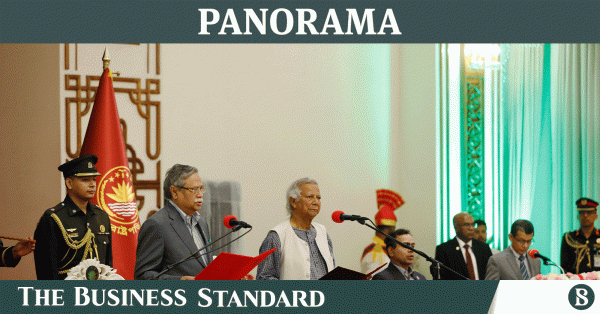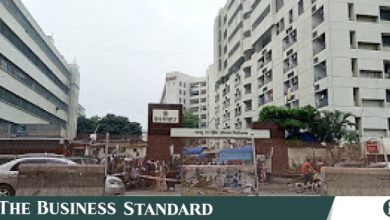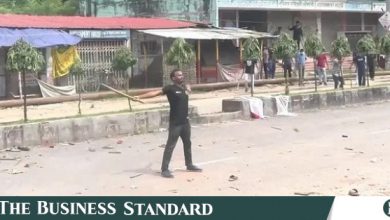Bangladesh’s post-revolution government is sailing through uncharted legal waters


Everything happened in the blink of an eye.
On 5 August, as the massive crowd started marching towards the Ganabhaban, Hasina left the country in a hurry after tendering her resignation. What happened in the succeeding days was also fast as, by 8 August, the president had dissolved the parliament and a new “interim government” had taken oath.
And it is perhaps the swiftness of it all, coupled with sporadic statements by Sajeeb Wazed that his mother has not resigned, recent rumours of the president resigning, and the not-so-distant memories of the 2006-08 state of emergency, that the legality and constitutionality of present interim has come under scrutiny.
What even is an interim government? How long will it stay and when will the next elections be? How is it going to pass the necessary reforms in the absence of a parliament? Are we getting a new constitution, as is common with most post-revolution countries? These are questions now swirling around.
Could it be like in Tunisia, where the fall of Ben Ali prompted their interim president to suspend the 1959 constitution in favour of a new one? Tunisia went about it by first electing a 217-member National Constituent Assembly. The constituent assembly then enacted a “Little Constitution”, which established the organisational principles of the state’s political administration during the transition period.
Finally, in the fall and winter of 2013, national dialogue played an important role in resolving a political deadlock and paved the way for a new constitution’s adoption in January 2014.
Or perhaps it could be like in Libya, where after the fall of Gaddafi, the National Transitional Council (NTC) appointed an interim cabinet to run the government until a new elected congress was in place.
Following elections in July 2012, the NTC handed over power to the General National Congress (GNC), whose mandate was to organise elections for a Constitution Drafting Assembly, and eventually a new parliament. The GNC prepared the 2017 draft Libyan constitution, which was approved by a two-thirds majority in July that year.
Could it be like Egypt, where after the ouster of Hosni Mubarak, the Supreme Council of the Armed Forces (SCAF) suspended the 1971 Constitution. Then it appointed a revision committee and submitted a dozen amendments for the same constitution to a referendum vote, which were adopted by an overwhelming majority of 77.2%.
But later, a Constitutional Declaration proclaimed by the SCAF went into effect, which included some 50 stipulations from the 1971 Constitution, as well as the amended articles that had been adopted by referendum.
The provisional declaration paved the way for the 2011 parliamentary elections and the 2012 presidential election, but it required that the parliament form a new constitutional drafting committee — the Constituent Assembly of Egypt — to write a permanent constitution. On 30 November 2012, the Assembly finally approved a draft constitution.
The possibilities are endless.
What is an ‘interim’ government?
The Supreme Court has ruled that since the prime minister had resigned and the president had dissolved the parliament, an interim government could be formed to carry out the “executive functions” of the state.
But legal validity is just the first step. What can the interim government actually do?
According to Rezaur Rahman Lenin, a rights activist and researcher with an academic background in comparative constitutional law, Bangladesh has employed the provisional or interim government concept in the past to navigate similar transitional periods, particularly following the overthrow of General Ershad’s government in 1990, setting a “notable precedent”.
However, in the absence of a legislature, the term “executive functions” poses a dilemma for the interim government, for which reforms are a key goal.
“The president’s recent dissolution of the parliament has raised constitutional concerns, as Bangladesh’s constitution prohibits the president from unilaterally dissolving parliament. This situation may necessitate further legal clarification and potential actions to validate the formation of an interim government,” Rahman noted.
Tunisia went about it by first electing a 217-member National Constituent Assembly. The constituent assembly then enacted a “Little Constitution”, which established the organisational principles of the state’s political administration during the transition period. Finally, in the fall and winter of 2013, national dialogue played an important role in resolving a political deadlock and paved the way for a new constitution’s adoption in January 2014.
Government advisers have already expressed intent to amend laws used to curtail freedom of expression or curb dissident views, “re-examine” clauses of the draconian Cyber Security Act (CSA), and to enact a new law to govern the activities of political parties, among others.
According to Rahman, the interim government can repeal, reform or enact new laws through ordinances.
“The interim government’s primary role is more comprehensive than helping the Election Commission hold free and fair elections within constitutional limits [unlike caretaker governments in the nation’s past]. It performs routine functions in addition to its interim government role. The constitution allows the interim government to make policy, but being an interim government may prevent it from making long-term policy decisions,” he said.
But legitimising amendments or ordinances (the interim government is not an elected one) and safeguarding their longevity (an elected parliament could overturn the laws in the future) will be two major challenges down the line.
There is also the question of the tenure of the interim government, which has yet to be fixed.
While political parties initially demanded that elections be held within 90 days, the interim government will likely need additional time to implement essential political reforms.
“The constitution does not mention a caretaker or interim government. This is why its duration is not stated. But Article 123 (3) (b) of the constitution requires elections within 90 days if parliament is dissolved for any reason other than term expiration. Sub Article 4 of 123 requires an election within 90 days of the period’s end unless a natural disaster prevents it,” Rahman noted.
The interim government’s Environment Adviser Syeda Rizwana Hasan has said the tenure would depend on the reform agenda, while Law Adviser Asif Nazrul and Youth and Sports Advisor Asif Mahmud Sajib Bhuiyan both said they will stay as long as they are needed.
The Bangladesh Nationalist Party (BNP), the de facto opposition to the ousted Awami League government, recently agreed to give the interim government more time to create a conducive environment for holding elections, suggesting that a longer tenure has at least been legitimised through some political consensus.
Ordinance and referendum now, parliament’s problem later
At present, the interim government is moving forward through political consensus by consulting with major and smaller parties, as well as the student movement coordinators, two of whom are members in the advisory council.
But if legitimacy is of the utmost priority, it could also bypass all representatives and go straight to the masses through a plebiscite or a referendum.
“Typically, a plebiscite seeks the validation or rejection of a government or policy rather than a choice between alternatives. Crucially, plebiscites afford administrations the direct means to seek the public’s viewpoint on pivotal matters such as government legitimacy, independent of political factions,” said Rahman.
The last time Bangladesh held a referendum was in 1991.
The Fifth Amendment to the constitution in 1979, which was later declared illegal by the Supreme Court in 2011, had introduced the provision for referendums.
It is important to note that unlike in the case of most other post-revolution countries, Bangladesh’s current constitution is still in place. In that case, Article 93 of the constitution, which states that ordinance-making power lies with the president of Bangladesh, can be an effective tool for enacting reformative laws.
Article 93, however, carries caveats. Ordinances made cannot be anything which “could not lawfully be made under this Constitution by Act of Parliament, for altering or repealing any provision of this Constitution, or continuing in force any provision of an Ordinance previously made.”
In short, ordinances cannot repeal old laws or remove anything from existing acts — they can only add to the constitution.
Furthermore, Rahman points out, ordinances necessitate parliamentary ratification to become laws.
“The parliament must ratify the ordinances within 30 days of its first session to determine whether they are valid or not,” he explained.
The next parliament might not decide to ratify all ordinances — out of the 122 ordinances issued during the tenure of the 2006-07 caretaker government, only 44 were approved for ratification by a special parliamentary committee in 2009.
Amendments to the constitution, approved by a future parliament, can also offer legitimacy for other actions undertaken by the interim government.
“Previous amendments, such as the Fifth and Seventh Amendments, have been critical in legalising military rule, highlighting the significance of constitutional amendments in addressing transitional governance issues,” Rezaur Rahman said.
Through the Seventh Amendment in 1986, Hussain Mohammad Ershad legitimised martial law and other laws made during 24 March 1982 and 11 November 1986. Before him, Ziaur Rahman did the same through the Fifth Amendment, which validated all laws made by military rulers following the 15 August 1975 coup d’état.
However, both amendments were later declared unconstitutional by the courts in 2010 and 2011, meaning despite securing legitimacy at the time, the amendments and what they legitimised could not stand the test of time.
Furthermore, in Bangladesh, there are two kinds of laws — primary legislation and secondary or delegated legislation. So, the president does not have to make laws just through ordinances, the delegated law-making authorities are still there.
A notable recent example of delegated legislation is the notification issued by the public administration ministry, which set the new allocation for quotas in government jobs in face of protests in July.
Delegated legislation does not need to be ratified by parliament.
The ball is in the Supreme Court
According to Rahman, the Supreme Court of Bangladesh, as the country’s constitutional court, is responsible for addressing issues where the law and precedents are unclear.
“The Supreme Court’s assertiveness in matters of judicial independence is evident, particularly in relatively non-political issues where the executive is willing to accept its lawmaking initiatives. Public demand and perception influenced the court to assume a more direct role in these cases. Given Bangladesh’s history of unconstitutional martial law regimes and weak democratic rules, it is likely that the court has considered these factors in many constitutional cases,” he further said.
Meanwhile, the High Court Division on 19 August issued a rule seeking to understand why the abolition of the caretaker government system through the Fifteenth Amendment to the Constitution will not be deemed illegal.
The law secretary, legislative secretary, and the secretary of the National Parliament Secretariat, among others involved, were directed to respond to this rule within the four weeks.
It remains to be seen whether the interim government is looking to attain constitutional legitimacy through this move.



